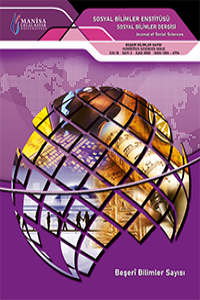Öz
Violinist and pedagogue Shinichi Suzuki’s philosophy was that talent is not inborn; it can be gained through proper education. Suzuki Method took off after the second world war and has achieved great success. Method, which starts children at a very early age, is also referred to as the “Mother Tongue Method”. The age of starting to play an instrument in classical music education is 7-8 but it decreased to 3 with the Suzuki Method. The main aim is to reach pre-schoolers and develop their skills in the most appropriate time. The success of the Suzuki, which takes the family into one-to-one education, arises from the fact that it focuses on family-student-teacher interaction at every stage of the education. With this structure, music is naturally involved in the development of the child and becomes sustainable. This research has been prepared through literature review and it examines the importance of instrument education constituents of the Suzuki Method and its effect on student motivation.
Anahtar Kelimeler
Kaynakça
- Referans1 GARSON, Alfred. (1970). “Learning with Suzuki”, ' Music Educators' J
- Referans2 GARSON, Alfred. (1973). Suzuki and Physical Movement ‘ Music Educators’ J
- Referans3 GRILLI, Susan. (1987). “Preschool in the Suzuki Spirit” Harcourt Brace Jovanovich Japan
- Referans4 HERMANN, Evelyn. (1999). “Shinichi Suzuki: The Man and His Philosophy” Alfred Music
- Referans5 TOPOĞLU Onur ve İŞGÖRÜR Ümit. (2015). “Türkiye’de Batı Müziği Eğitimi Veren Devlet Konservatuvarları ve Vakıf Üniversiteleri Müzik Bölümlerinin Belirlenmesi ve Bu Kurumlarda Eğitim Veren Akademisyenlerin Çeşitli Değişkenler Açısından İncelenmesi” Turkish Studies International Periodical For the Language
- Referans6 KENDALL, John. (1986). Suzuki’s Mother Tongue Method, MEJ (Music Educators Journal)
- Referans7 MAMAÇ, Serdar. (2018) “Eğitim Fakültesi Müzik Eğitimi Anabilim Dallarında Öğrenim Gören Öğrencilerin Gam Çalışma Durumlarının İncelenmesi” Turkish Studies International Periodical For the Languages
- Referans8 SUZUKI, Shinichi. (1969). “Ability Development from Age Zero” Suzuki Method International
- Referans9 STARR, William. (1976). “The Suzuki Violinist” Alfred Music
- Referans10 STARR, William ve STARR, Constance. (1983). “To Learn With Love” Summy-Birchhard INC
- Referans11 SLONE KAY, Collier. (1985). “They’re Rarely Too Young And Never Too Old To Twinkle!” Shar Publications
- Referans12 Suzuki Muzik Eğitim Derneği http://suzukimuzik.com/
Öz
Kemancı ve pedagog Shinichi Suzuki, II. Dünya Savaşı sonrasında uygulamaya koyduğu bu metotla yeteneğin doğuştan olmadığını, eğitim ile kazanılabileceğini ilk defa öne sürerek tüm dünyada dikkat çekmiştir. Ana Dil Metodu olarak da adlandırdığı bu yaklaşımla çocuklar çok küçük yaşta müzik eğitimine başlayabilmektedir. Klasik müzik eğitiminde enstrüman çalmaya başlama yaşı 7-8 iken Suzuki Metodu ile bu yaş 3’e inmiştir. Eğitim felsefesinin çekirdeğini oluşturan fikirde, çocuğun doğduktan itibaren konuşmayı öğrenme basamaklarının müzik eğitimine adapte edilmesi düşüncesi vardır. Bu yaklaşım ile okul öncesi çocuklara ulaşarak becerilerini en uygun zamanda ve en doğru şekilde geliştirmek amaç olmuştur. Aileyi bire bir eğitimin içine alan Suzuki Metodunun başarısı, eğitimin her aşamasında çocuğun motivasyonuna yönelik aile-öğrenci-eğitmen etkileşimine odaklı olmasından kaynaklanır. Bu yapı ile müzik, çocuğun gelişiminde doğallıkla yer alır, sürdürülebilir olur. Araştırma, literatür tarama yapılarak yazılmış, Suzuki Müzik Eğitimi Metoduyla verilen çalgı eğitimini oluşturan ögelerin önemi ortaya konularak bu ögelerin öğrenci motivasyonundaki etkileri açıklanmıştır.
Anahtar Kelimeler
Kaynakça
- Referans1 GARSON, Alfred. (1970). “Learning with Suzuki”, ' Music Educators' J
- Referans2 GARSON, Alfred. (1973). Suzuki and Physical Movement ‘ Music Educators’ J
- Referans3 GRILLI, Susan. (1987). “Preschool in the Suzuki Spirit” Harcourt Brace Jovanovich Japan
- Referans4 HERMANN, Evelyn. (1999). “Shinichi Suzuki: The Man and His Philosophy” Alfred Music
- Referans5 TOPOĞLU Onur ve İŞGÖRÜR Ümit. (2015). “Türkiye’de Batı Müziği Eğitimi Veren Devlet Konservatuvarları ve Vakıf Üniversiteleri Müzik Bölümlerinin Belirlenmesi ve Bu Kurumlarda Eğitim Veren Akademisyenlerin Çeşitli Değişkenler Açısından İncelenmesi” Turkish Studies International Periodical For the Language
- Referans6 KENDALL, John. (1986). Suzuki’s Mother Tongue Method, MEJ (Music Educators Journal)
- Referans7 MAMAÇ, Serdar. (2018) “Eğitim Fakültesi Müzik Eğitimi Anabilim Dallarında Öğrenim Gören Öğrencilerin Gam Çalışma Durumlarının İncelenmesi” Turkish Studies International Periodical For the Languages
- Referans8 SUZUKI, Shinichi. (1969). “Ability Development from Age Zero” Suzuki Method International
- Referans9 STARR, William. (1976). “The Suzuki Violinist” Alfred Music
- Referans10 STARR, William ve STARR, Constance. (1983). “To Learn With Love” Summy-Birchhard INC
- Referans11 SLONE KAY, Collier. (1985). “They’re Rarely Too Young And Never Too Old To Twinkle!” Shar Publications
- Referans12 Suzuki Muzik Eğitim Derneği http://suzukimuzik.com/
Ayrıntılar
| Birincil Dil | Türkçe |
|---|---|
| Bölüm | Beşeri Bilimler Sayısı |
| Yazarlar | |
| Yayımlanma Tarihi | 25 Eylül 2020 |
| Yayımlandığı Sayı | Yıl 2020 Cilt: 18 Sayı: 3 |


